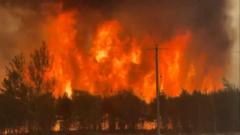As wildfires spread across Canada, military aircraft are facilitating rapid evacuations to safeguard affected residents, amid predictions of worsening fire conditions.
**Military Evacuations Amidst Aggressive Wildfires in Canada**

**Military Evacuations Amidst Aggressive Wildfires in Canada**
Residents in Manitoba and Saskatchewan are being evacuated as wildfires rage, escalating into an emergency situation.
The Canadian provinces of Manitoba and Saskatchewan are facing serious wildfires, leading to emergency evacuations for thousands of residents. Military aircraft and helicopters have been deployed to assist in the taming of rapidly advancing flames, with a particular focus on the northern community of Pukatawagan, where more than 2,000 individuals are still in need of transport to safety.
The situation is dire, with over 180 wildfires reported nationwide, compounded by unfavorable weather forecasts that predict hot and dry conditions in the coming days. Both provinces have declared states of emergency and have reached out for international aid in battling the blazes, which are further complicated by dense smoke that has also spread across parts of the United States.
Currently, Manitoba has 25 fires, with 10 classified as out of control, and only essential personnel remain in the city of Flin Flon. In Saskatchewan, 16 wildfires are raging, with seven deemed not contained. Meteorologists from Environment and Climate Change Canada have warned of extreme conditions, as wind from an approaching cold front could exacerbate the ongoing fires, creating optimal conditions for further spreading.
These massive wildfires have also affected air quality across the northern United States, impacting an estimated 22 million Americans this weekend. States like Michigan and Wisconsin have issued advisories, warning residents of "unhealthy" smoke levels that are expected to persist through Monday evening.
The 2023 wildfire season has marked Canada's worst on record, resulting in over 42 million acres burned. Experts from the UN have noted that while wildfires are a natural occurrence in the region, climate change is amplifying the conditions conducive to their spread, with prolonged heat and dryness contributing to the intensity and frequency of such wildfires.
The situation is dire, with over 180 wildfires reported nationwide, compounded by unfavorable weather forecasts that predict hot and dry conditions in the coming days. Both provinces have declared states of emergency and have reached out for international aid in battling the blazes, which are further complicated by dense smoke that has also spread across parts of the United States.
Currently, Manitoba has 25 fires, with 10 classified as out of control, and only essential personnel remain in the city of Flin Flon. In Saskatchewan, 16 wildfires are raging, with seven deemed not contained. Meteorologists from Environment and Climate Change Canada have warned of extreme conditions, as wind from an approaching cold front could exacerbate the ongoing fires, creating optimal conditions for further spreading.
These massive wildfires have also affected air quality across the northern United States, impacting an estimated 22 million Americans this weekend. States like Michigan and Wisconsin have issued advisories, warning residents of "unhealthy" smoke levels that are expected to persist through Monday evening.
The 2023 wildfire season has marked Canada's worst on record, resulting in over 42 million acres burned. Experts from the UN have noted that while wildfires are a natural occurrence in the region, climate change is amplifying the conditions conducive to their spread, with prolonged heat and dryness contributing to the intensity and frequency of such wildfires.






















